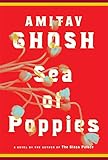Anyone who has diligently read my Millions posts over the years (and I know you’re out there, somewhere) will know that I’m drawn to stories written by or about immigrants, whether it’s Mavis Gallant as the ex-pat Canadian writer in Paris writing about European post-war dislocation, Goran Simic writing in his adopted home of Canada about Sarajevo in the 90s, Rawi Hage, also in his adopted country Canada writing about the streets of Beirut in the 80s, or Michael Ondaatje returning to his Sri Lankan roots to write about the generations that came before him.
So I’m more than a little embarrassed to confess that until about five minutes ago, I hadn’t realized that the three readings I attended a few weeks ago at the Toronto International Authors Festival could also be linked by this same theme. I’ve already written about Sarah Vowell on the Puritan immigrants to the Massachusetts Bay colony in the 1630s, and then Junot Díaz, together with Rawi Hage, speaking of the experience of being immigrant authors writing about immigrant families in modern cosmopolitan North America.
The third reading I attended was by Amitav Ghosh, the Calcutta-born writer who, in a little over fifty years has also lived in Sri Lanka, Delhi, Goa, Egypt, Britain, and the United States, where he lives part of the year with his American wife. A multiple emigre with an admitted sense of dislocation, he’s the first in fourteen generations to marry outside his Bengali home district. He has spent a lifetime writing about dislocation and displacement, with their resultant sense of loss, but also with their capacity for opportunity.
 Ghosh spoke with CBC Radio’s Eleanor Wachtel for well over an hour on his extraordinary life and on his latest novel, Sea of Poppies. The interview was recorded and edited down to 45 minutes for Wachtel’s Writers & Co. radio show. A few quotes and observations:
Ghosh spoke with CBC Radio’s Eleanor Wachtel for well over an hour on his extraordinary life and on his latest novel, Sea of Poppies. The interview was recorded and edited down to 45 minutes for Wachtel’s Writers & Co. radio show. A few quotes and observations:
On the Maoist insurgency in Calcutta during his boyhood, on the upheaval around him: it was “formative to see places that are convulsed.” On the anti-Hindu riots of 1964, as hundreds of Hindus took refuge at the Ghosh family compound, Ghosh says that “because there were so many people, you don’t feel that palpable threat.”
From age nine to eleven, he lived in Sri Lanka; with its beaches it proved to be “a kind of wonderland” for young Amitav. But even as a child, he sensed that “normal is never normal,” and with the ethnic strife he was aware of “tectonic plates shifting underneath.” This led to an interesting sidebar on the false assumption of security that many people have. When something horrific like 9/11 happens, Ghosh continues, those with that mindset tend to swing to overreaction.
College in Delhi was “intellectually stimulating,” more so than the time he would later spend learning and teaching at Oxford and Harvard. Ghosh went on to live in Egypt in the 1980s which led to a discussion on India’s forgotten relationships: with Egypt, with China. India attempted and failed at one time to rebuild bridges between cultures whose relationships were interrupted by colonialism.
On his beloved Indian ocean, Ghosh affirmed his affection for the “multiplicity of it.” Every part of it is different – Calcutta from Madras from Burma from Mauritius. On the repression in Burma, Ghosh believes that “politics is not capable of devouring the entirety of life,” so even in an oppressive Burma, friendships, and a life outside of the political reality, can form and flourish.
His latest novel, Sea Of Poppies, is the first part of a proposed trilogy, and deals with indentured migrant workers in the 1830s, replacing African slaves after the abolition of the slave trade. They were poppy growers during the Opium Wars. Ghosh spoke of the roots of the wars: China, due to mass-addiction, bans the importation of opium; consequently Britain goes to war to reinstate the “free-trade” of opium. This led to Ghosh musing rhetorically: “How is it free if governments wage a war to enhance the trade?”
Ghosh commented that portions of the novel – bits of dialogue – are written in a kind of pidgin English. He comments that “as writers, language is the equivalent of a mise-en-scene.” It serves many purposes, one of them being as “white noise,” rather than to communicate information. Consequently, there’s no need to understand every word, no need to decode the pidgin English.
And Ghosh also commented that there are few narratives of departure among immigrant writers. Most tend to write about the life of arrival, rather than the life of leaving.









